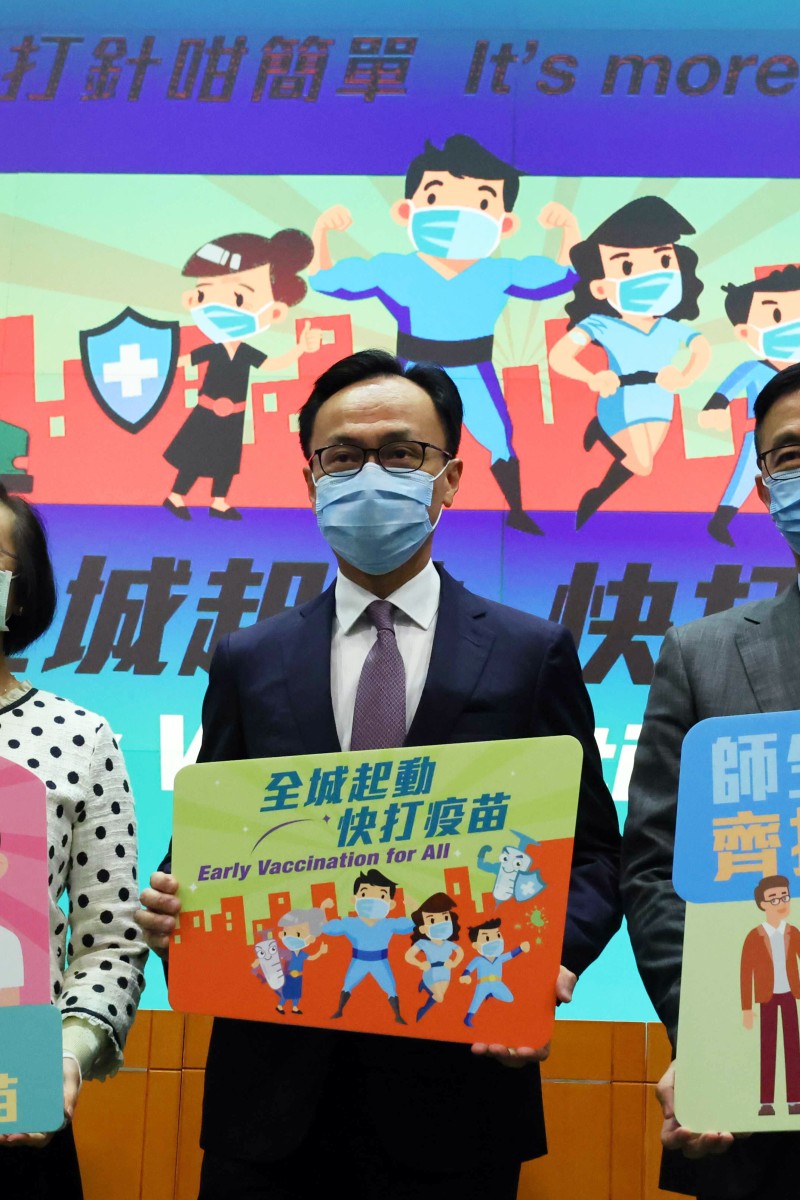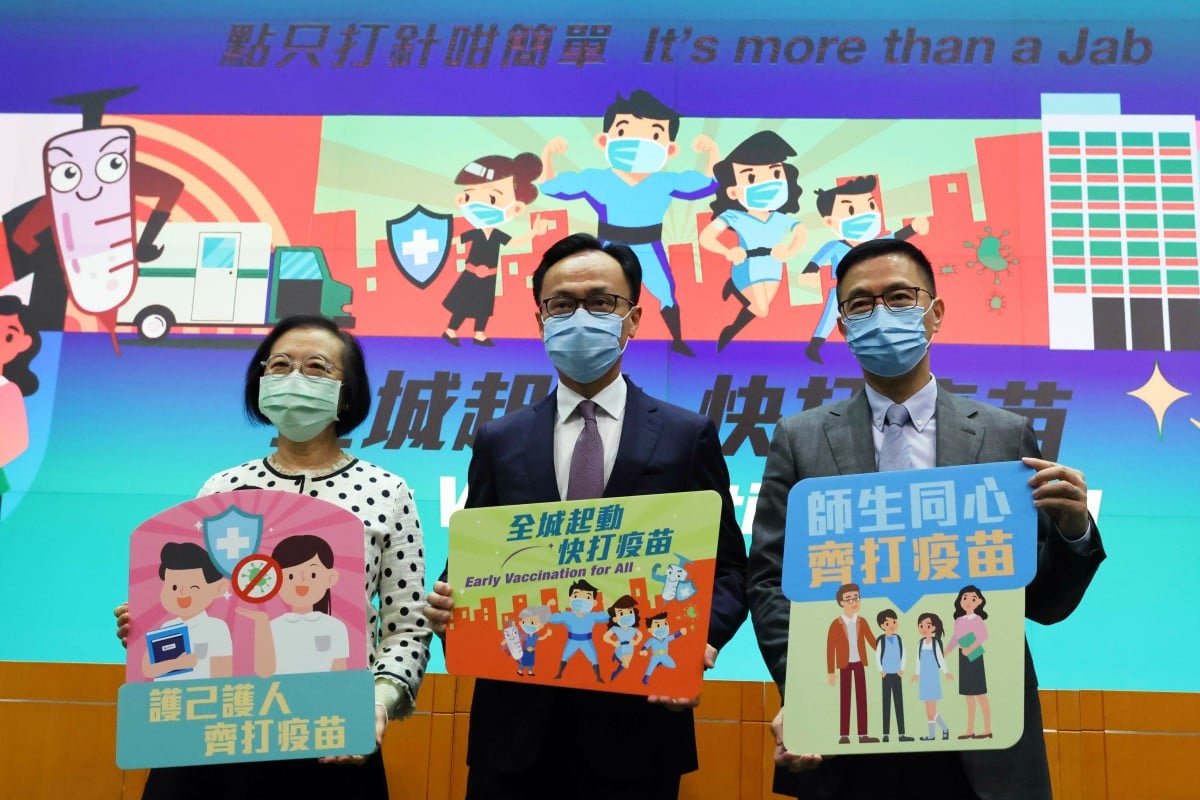
- Students aged 12-15 can book the BioNTech coroanvirus jab beginning today, and younger children may soon become eligible
- Here’s what you need to know about the vaccine, its side effects, and how it could loosen social distancing restrictions
 Sophia Chan, Secretary for Food and Health; Patrick Nip, Secretary for the Civil Service and Kevin Yeung, Secretary for Education, meet the media to speak about the COVID-19 Vaccination Programme. Photo: SCMP/Dickson Lee
Sophia Chan, Secretary for Food and Health; Patrick Nip, Secretary for the Civil Service and Kevin Yeung, Secretary for Education, meet the media to speak about the COVID-19 Vaccination Programme. Photo: SCMP/Dickson LeeHongkongers as young as 12 can book Covid-19 vaccination slots beginning today and receive the BioNTech jabs as early as Monday, while primary school students may become eligible for the shots once clinical data shows it is safe.
Hong Kong's unused vaccines could be thrown away
The step, revealed by the government on Thursday, meant an additional 240,000 residents would be covered by the programme, taking the total to just over 90 per cent of the city’s population of 7.5 million, but the drive remained sluggish and only about 15 per cent of people were fully inoculated.
“Vaccination is vitally important in protecting adolescents and children from Covid-19 infections and stopping its spread in the community,” civil service minister Patrick Nip Tak-kuen said, adding the next three months would be the “critical stage”.
Nip urged all unvaccinated residents to receive at least a first shot by late August, as the city’s 29 community vaccination centres are scheduled to close in late September.
However, the move may not do much to boost the city's vaccination rates: only about 36 per cent of 700 secondary school students polled by the University of Hong Kong said they were willing to take the vaccine, while many parents preferred to adopt a “wait-and-see” approach.
At least 13 countries have already approved vaccinating children aged 12 or older with the BioNTech shots, while more than 3 million have received the vaccine.
Here's what you need to know about the vaccination scheme for people age 12-15.
Vaccinated Hongkongers can enter lotteries to win a host of prizes - take a look at our list
When and how will the government’s vaccination drive for schoolchildren start?
The government will have three ways for students to get the vaccine: bookings for individuals directly on the official vaccination website; busing in students, parents and staff to and from inoculation centres as soon as June 21; and conducting campus outreach programmes from June 28 at the earliest if enough people sign up for a jab.
Those below 18 are required to bring along a consent form signed by their parents to get vaccinated. The form can be downloaded from the government’s vaccination website.
What are the side effects of the vaccine among adolescents?
A study involving 2,260 people aged 12 to 15 published in the New England Journal of Medicine last month found the BioNTech vaccine provided a protection rate of 100 per cent after both doses. Sixteen out of 1,129 people (1.4 per cent) in the placebo group (those who didn't receive the vaccine) were infected with Covid-19.
The main side effects reported by participants were pain at the injection site (86 per cent), fatigue (66 per cent) and headache (65 per cent).No serious adverse events were reported.
You can expect some arm soreness and tiredness after the vaccine, especially the second jab. Photo: Bloomberg
Dr Winnie Tse Wing-yee, president of the Hong Kong College of Paediatricians, said it was generally safe for young people to get the shot because most of them do not suffer from high blood sugar, high blood pressure or high cholesterol.
Tse said three types of people should consult doctors before taking the jab: those who have severe food or drug allergies; people suffering from autoimmune diseases and who are being treated with immunosuppressive drugs or steroids in large doses; and cancer patients who had received immunosuppressive drugs, chemotherapy or radiotherapy in the past three months or plan to do so in the next two months.
Unvaccinated people could be banned from certain places if there is a fifth wave
How severe are symptoms and conditions for an unvaccinated child infected with the coronavirus?
Dr Mike Kwan Yat-wah, a consultant at Princess Margaret Hospital’s department of paediatrics and adolescent medicine, said many children who recovered from Covid-19 had weakened lung function, while some suffered serious complications such as multisystem inflammatory syndrome or Kawasaki-like disease, a rare inflammation of the blood vessels that typically affects small children. For some, the senses of smell and taste had also weakened.
Recent examples in Hong Kong included an infected patient not being able to detect a burning smell coming from the kitchen, while another smelled sewage when there was no such stench, Kwan added. In one serious case, a child with Covid-19 developed haemolysis, a condition characterised by the breakdown of red blood cells.
A vaccine expert answers all your questions about the jab
What benefits can vaccination bring for children in schools or in other social settings?
Secretary for Education Kevin Yeung Yun-hung said schools with a vaccination rate of 70 to 80 per cent “are likely to be prepared” for the resumption of full-day face-to-face classes according to views from health experts.
He added that a decision would be made based on the overall pandemic situation, the preparedness of individual schools or the entire sector, and the advice of experts.
'Don't treat the pandemic like it's over," says WHO head
Some health experts have recommended campuses with a vaccination rate of more than 70 per cent be allowed to resume full-day classes with lunchtime meals and exempt students from wearing masks during physical education classes or other activities.
But some parents said they did not wish to link full-day resumption of classes or other relaxations in infection control measures to vaccination, as they felt it could affect the relationship between parents and schools. They expressed concerns that parents might start pointing fingers at one another amid different views towards vaccination, and said the rights of parents and children in choosing whether to get vaccinated or not should also be respected.